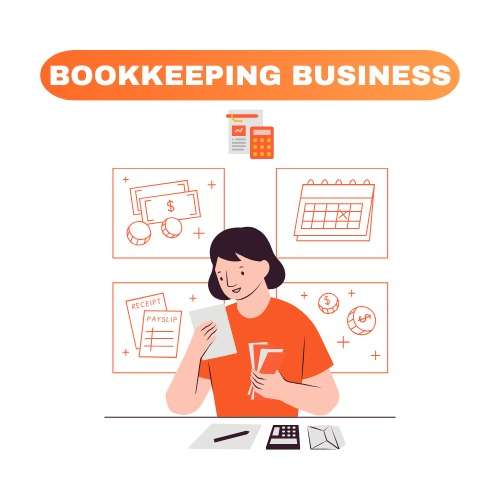Have you ever dreamed of being the financial guru every business relies on? Starting a bookkeeping business could be your golden ticket. In today’s digitally-driven economy, precise financial management is the heartbeat of every successful venture, big or small. While the idea of numbers, ledgers, and balance sheets might intimidate some, for others, it’s a world of opportunities waiting to be explored. Whether you’re a math learning enthusiast or someone with a keen eye for detail, the journey to establishing a bookkeeping business is both rewarding and empowering. With the right steps, dedication, and a dash of entrepreneurial spirit, you can transform your dream into a profitable reality. Dive in as we unravel the five must-follow steps to launch your very own bookkeeping business.
Introduction to Bookkeeping Business
Starting a “bookkeeping business” is akin to embarking on a journey through the financial veins of the corporate world. Bookkeeping, at its core, is the systematic recording and organization of financial transactions in a company. It’s the pulse check, ensuring the heart of a business—its finances—is beating strong. A bookkeeping business, therefore, doesn’t just deal with numbers but also fosters trust as clients hand over the intimate details of their financial health, hoping for accuracy, transparency, and guidance.
The Growing Importance of Bookkeeping

In today’s rapidly evolving economic climate, the importance of a proficient bookkeeping business has skyrocketed. With the maze of transactions, from online sales to international deals, businesses can quickly get overwhelmed. Efficient bookkeeping provides clarity amidst this chaos. It’s not just about logging numbers; it’s about painting a clear financial picture, ensuring that businesses navigate safely without the threat of financial discrepancies. As more companies recognize the need for expert financial tracking, the demand for a reliable bookkeeping business becomes paramount.
Step 1: Acquiring the Necessary Skills and Certification
Formal Education and Courses:
Entering the world of bookkeeping doesn’t mandate an accounting degree. But a foundational understanding is crucial. Several community colleges and online platforms offer courses in bookkeeping. These delve into topics like accounts receivable, payroll procedures, and financial statements. It’s a fantastic way to acquire the essential skills.
Certification Programs:
Becoming a certified bookkeeper is an added advantage. It’s akin to a badge of authenticity, telling clients you mean business. Certification bodies, like the American Institute of Professional Bookkeepers or the National Bookkeepers Association, offer exams that, once passed, boost your market credibility substantially.
Step 2: Creating a Business Plan
Defining Your Niche:
The world of business is vast. Are you keen on helping small businesses, or do larger corporations catch your eye? Perhaps the complex financial aspects of the tech industry intrigue you. Choosing a niche sharpens your focus and services.
Setting Clear Objectives:
You wouldn’t embark on a road trip without a map. Likewise, clearly defined goals guide your business journey. Think about where you want to be in a year, five years, or a decade. Having these milestones will steer your efforts. You can manage your business objectives throughout the year with the help of yearly planner templates. These templates allow you to define your goal, manage your finances for each goal, and track your progress throughout the year.
Step 3: Registering Your Business
Choosing the Right Business Entity:
The structure of your business impacts crucial aspects like liability, taxation, and administration. Options range from sole proprietorships to LLCs. Each has its pros and cons. For instance, while sole proprietorships are simpler and cheaper, LLCs provide personal liability protection. Steps to register a company
Legal Requirements:
Beyond just choosing a business name, understand the licensing requirements in your jurisdiction. Depending on the state, you might need a business license, a sales tax permit, or even specific bookkeeping certifications.
Step 4: Building an Online Presence
Creating a Website:
Your website is the digital storefront for your business. Whether a client hears about you from a friend or stumbles upon you online, they’ll likely check your site. Ensure it’s professional, mobile-responsive, and provides clear information on your services.
Social Media Strategies:
Platforms like LinkedIn, Twitter, or even Instagram offer avenues to connect with potential clients. Share relevant articles, showcase client testimonials, and engage in meaningful conversations to encourage trust and generate customer referrals.
Using an instagram bot can help streamline your social media interactions, making it easier to maintain consistent engagement with your audience. Social media isn’t just about broadcasting; it’s about building relationships. With 5.04 billion people in the world using social media – over half the global population – leveraging these platforms strategically can significantly expand your reach and impact.
Step 5: Setting Up Your Workspace and Tools
Home Office Tips:
If you’re initiating your journey from home, demarcate a workspace. This space should be free from distractions, well-lit, and organized. Invest in good furniture, especially a comfortable chair. Remember, the environment significantly impacts productivity.
Essential Bookkeeping Tools:
Today’s market offers numerous software tools tailored for bookkeepers. Programs like QuickBooks, FreshBooks, or Xero can streamline tasks. They handle everything from invoicing to reconciliations. As your business grows, these tools will become indispensable assets.
Conclusion
Diving into the world of bookkeeping is a strategic move in today’s financial landscape. With the right steps, starting a bookkeeping business can be both fulfilling and profitable. Remember, success lies not just in mastering the numbers but also in understanding the nuances of the business environment and building lasting client relationships. As you embark on this journey, equip yourself with knowledge, passion, and resilience. Are you ready to turn your bookkeeping dreams into reality? What’s the first step you’ll take towards this venture?
FAQs
1. Do I need a degree in finance to start a bookkeeping business?
No, but understanding the basics and getting certified can enhance credibility.
2. How much can I expect to earn as a bookkeeper?
It varies based on expertise and clientele, but many bookkeepers earn a decent income.
3. Is it essential to have a physical office?
Not necessarily. Many successful bookkeepers operate from home.
4. How do I find my first clients?
Networking events, referrals, and a strong online presence can attract potential clients.
5. How do I keep up with changing financial regulations?
Continuous learning, attending workshops, and joining forums can keep you updated.

